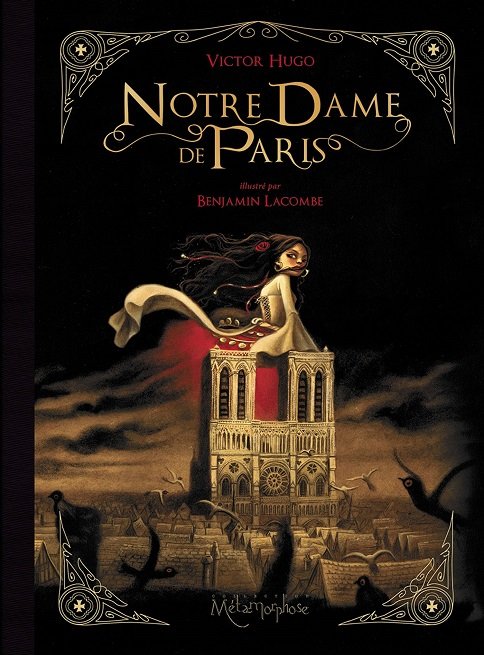Victor Hugo and his book "Notre-Dame de Paris"
The project to write the novel "Notre-Dame de Paris" was born in November 1828. Victor Hugo conceived this work under the influence of the then fashionable enthusiasm among French Romantics in the Middle Ages. Hugo shares a strange discovery that has prompted him to write the novel: in the half-darkness of a chapel, inside the Notre Dame Cathedral, he relies on a fate written on one of the walls. The first pages were written on July 25, 1830, two days before the Revolution broke out and the Parisian crowd. The novel was completed in January 1831. Hugo consciously researches the time of Louis XII through historical writings, chronicles, charters, and royal regulations, examining all the buildings that survived at that time, acquiring a complete picture of the stylistic features of the then architecture.
He hopes everything in his novel will be plausible, but in his preliminary remarks emphasizes elsewhere: "After all, this is not the most important thing in this book. If it has any dignity, it is that it is the creature of the imagination, of the arbitrary ideas of fantasy. "Indeed, the scheme in which the intimate drama unfolds in this novel is born of a motif deeply embedded in the personal creative fantasy of Hugo. In it, the archdeacon and Captain Feeb de Châteaupe are rivals in the conquest of the glory and love of the beautiful Gypsy Esmeralda. In this historical novel, Hugo follows the propagating dramatic contradictions in a transitional epoch for France, the second half of the 15th century, the period of rule of King Louis XI, during which new, Renaissance trends in the spiritual life and mores emerged in the bosom of the late medieval society . The ambition of the novelist Hugo is to reproduce the unique "local color" of the historical era, through which the printed books ("many-page architectural monuments") are replacing the imposing Gothic cathedrals.
It is also a time of social unrest when the hierarchy of the feudal society begins to collapse, the authority of the court noun and the clerical caste is shaken, the people of the people are freed from their faithful humility and realize liberty and tyrannaborism as natural human aspirations as inalienable for each individual earthly spiritual commitments. The center of interest in romance Hugo is the intimate drama of the archdeacon Claude Frollo, the spiritual assistant of the Church in Notre Dame, who is the victim of her unclean passion for the beautiful Gypsy Esmeralda, a colorful personification of the cheerful spiritual attitude of the man of the Renaissance. Captivated by capturing his sensual gusts, the archdeacon tries to distract Esmeralda with the help of the quavering quay of the Quasimodo Cathedral, who has vowed to serve him with no-frills, with almost animal devotion. Châteaupe, captain of the Royal Guard, saves the beautiful gypsy, who falls in love with his insolent pride in his savior. Because of his attempt to abduct Esmeralda, repulsive of the ugly bell, he was tied to the shrouded pillar of the square in front of Notre Dame. Surprised by compassionate sympathy, the good-hearted gypsy gives water to torture by the fierce crowd of wandering wanderers who cling to her with zealous dedication. Meanwhile, the vengeful archdeacon Claude Frollo secretly organized the assassination of his "rival" Féb du Châteauer. He directs his suspicions to the volitional Esmeralda, who refuses to give up his lustful aspirations. The innocent girl is forced to publicly admit "crime" to the square in front of Notre Dame and to repent. Being enthralled by the beauty and gentleness of the beautiful Gypsy, Quasimodo manages to kidnap her and take her to her in the cathedral where, according to the custom, the girl ceases to be subject to secular laws.

I like
nice
Hugo - literature on the amateur, of course. Everything is very epic and hyperbolized.
The plot is probably familiar to everyone, at least for a musical, which enjoyed a frenzied popularity at the beginning of the two thousandth. Here, the love pentagon, and the tragic interweaving of the fate of the heroes and an incredible number of colorful descriptions of Paris at the time. One of these descriptions Hugo even took a whole chapter. Thus, the city itself is one of the key characters in the novel, and this is certainly very interesting.
What a little depresses me personally is the very hyperbolization of the heroes' feelings. They all have some incredible tear and it is filled with tragic poetry. It is understandable, because Hugo created exactly the heyday of the Romantic era in art. His characters are somehow childishly naive, sensual and easily excitable, like mental patients. Passionate love, for which you can go for murder, even more passionate love, for which you can find the strength to overcome the sex of the city, endlessly passionate love, for which you can die of anguish. In general, everything is straight at the limit, or even behind it.
And since this is an epic literature, the plot is very dimensional, no one is in a hurry. The author explains everything to us, even what we already seemed to understand, we simply do not leave room for speculation, we were all cheated and presented. But this, of course, is the cost of the genre, I understand. And Hugo, of course, is not the most terrible representative of such literature. In general, as I said, an amateur.
You have recieved a free upvote from minnowpond, Send 0.1 -> 10 SBD with your post url as the memo to recieve an upvote from up to 100 accounts!
good job
awesome concept sir.. i like this..thanks for share your inportant concept..